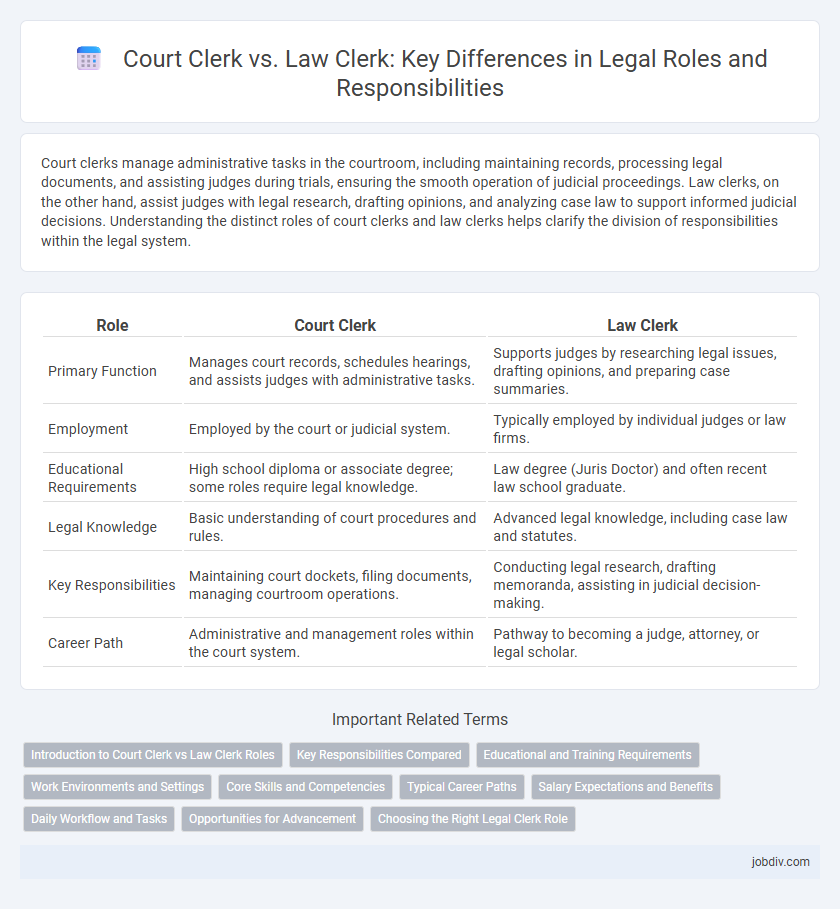Court clerks manage administrative tasks in the courtroom, including maintaining records, processing legal documents, and assisting judges during trials, ensuring the smooth operation of judicial proceedings. Law clerks, on the other hand, assist judges with legal research, drafting opinions, and analyzing case law to support informed judicial decisions. Understanding the distinct roles of court clerks and law clerks helps clarify the division of responsibilities within the legal system.
Table of Comparison
| Role | Court Clerk | Law Clerk |
|---|---|---|
| Primary Function | Manages court records, schedules hearings, and assists judges with administrative tasks. | Supports judges by researching legal issues, drafting opinions, and preparing case summaries. |
| Employment | Employed by the court or judicial system. | Typically employed by individual judges or law firms. |
| Educational Requirements | High school diploma or associate degree; some roles require legal knowledge. | Law degree (Juris Doctor) and often recent law school graduate. |
| Legal Knowledge | Basic understanding of court procedures and rules. | Advanced legal knowledge, including case law and statutes. |
| Key Responsibilities | Maintaining court dockets, filing documents, managing courtroom operations. | Conducting legal research, drafting memoranda, assisting in judicial decision-making. |
| Career Path | Administrative and management roles within the court system. | Pathway to becoming a judge, attorney, or legal scholar. |
Introduction to Court Clerk vs Law Clerk Roles
Court Clerks manage administrative tasks within the judicial system, including case file organization, court scheduling, and record maintenance to ensure smooth courtroom operations. Law Clerks assist judges by conducting legal research, drafting opinions, and preparing case summaries to support judicial decision-making. Distinguishing the Court Clerk's administrative responsibilities from the Law Clerk's legal analysis is essential for understanding courtroom workflow and support roles.
Key Responsibilities Compared
Court clerks manage administrative duties such as maintaining court records, scheduling hearings, and assisting judges during trials, ensuring smooth courtroom operations. Law clerks conduct legal research, draft memos, and assist judges by analyzing case law to support informed judicial decisions. While court clerks focus on clerical and organizational tasks, law clerks provide critical legal analysis and writing assistance.
Educational and Training Requirements
Court clerks typically require a high school diploma or equivalent, with many positions favoring candidates who have completed an associate degree or specialized training in legal studies; on-the-job training is common for procedural proficiency in court operations. Law clerks usually possess a law degree (Juris Doctor) or are law students enrolled in accredited law schools, often requiring strong research and writing skills honed through rigorous legal education and internships. The educational disparity highlights the court clerk's administrative role versus the law clerk's analytical and legal research responsibilities.
Work Environments and Settings
Court Clerks typically work in courthouse offices, managing administrative tasks such as case filings, court schedules, and record keeping within the judicial system. Law Clerks often operate in judges' chambers or law firms, conducting legal research, drafting opinions, and assisting with case preparation. Both roles require strong organizational skills but differ in proximity to judicial decision-making and direct legal analysis.
Core Skills and Competencies
Court Clerks require strong organizational skills, attention to detail, and knowledge of court procedures to manage case files efficiently and maintain accurate records. Law Clerks must possess advanced legal research abilities, critical thinking, and strong writing skills to assist judges or attorneys in preparing legal opinions and memoranda. Both roles demand excellent communication and time management competencies, but Law Clerks focus more on analytical skills while Court Clerks emphasize administrative precision.
Typical Career Paths
Court clerks typically pursue career paths involving administrative and procedural support within the judiciary, often advancing to senior clerk roles or court administrator positions through experience and certifications. Law clerks usually follow career trajectories focused on legal research and writing, frequently progressing to become licensed attorneys, judges, or legal consultants after completing law school and gaining experience in law offices or judicial chambers. Both roles require distinct skill sets and professional qualifications, with court clerks emphasizing court operations and law clerks specializing in legal analysis and case preparation.
Salary Expectations and Benefits
Court clerks typically earn an average salary ranging from $40,000 to $60,000 annually, with benefits including health insurance, retirement plans, and paid leave. Law clerks, often working for judges or law firms, usually receive higher compensation, averaging between $50,000 and $80,000 per year, reflecting their specialized legal training and responsibilities. Benefits for law clerks often encompass professional development opportunities, in addition to standard health and retirement packages.
Daily Workflow and Tasks
Court clerks manage daily courtroom operations by maintaining official records, scheduling hearings, and handling case documentation. Law clerks assist judges by conducting legal research, drafting memos, and preparing case briefs to support judicial decision-making. Both roles require attention to detail, but court clerks emphasize administrative duties while law clerks focus on legal analysis and writing.
Opportunities for Advancement
Court clerks can advance to senior clerk positions, office management roles, or judicial administrative specialists by gaining experience and relevant certifications. Law clerks often progress to becoming licensed attorneys, legal researchers, or judges' assistants through law school completion and passing the bar exam. Both roles offer opportunities in judicial administration, but law clerks generally have broader career advancement potential within the legal profession.
Choosing the Right Legal Clerk Role
Choosing the right legal clerk role depends on understanding the distinct responsibilities of a court clerk and a law clerk. A court clerk manages administrative duties within the judicial system, such as maintaining court records, scheduling hearings, and assisting judges during trials. In contrast, a law clerk conducts legal research, drafts memos and opinions, and supports attorneys with case preparation, making the decision critical for aligning career goals with job functions.
Court Clerk vs Law Clerk Infographic

 jobdiv.com
jobdiv.com